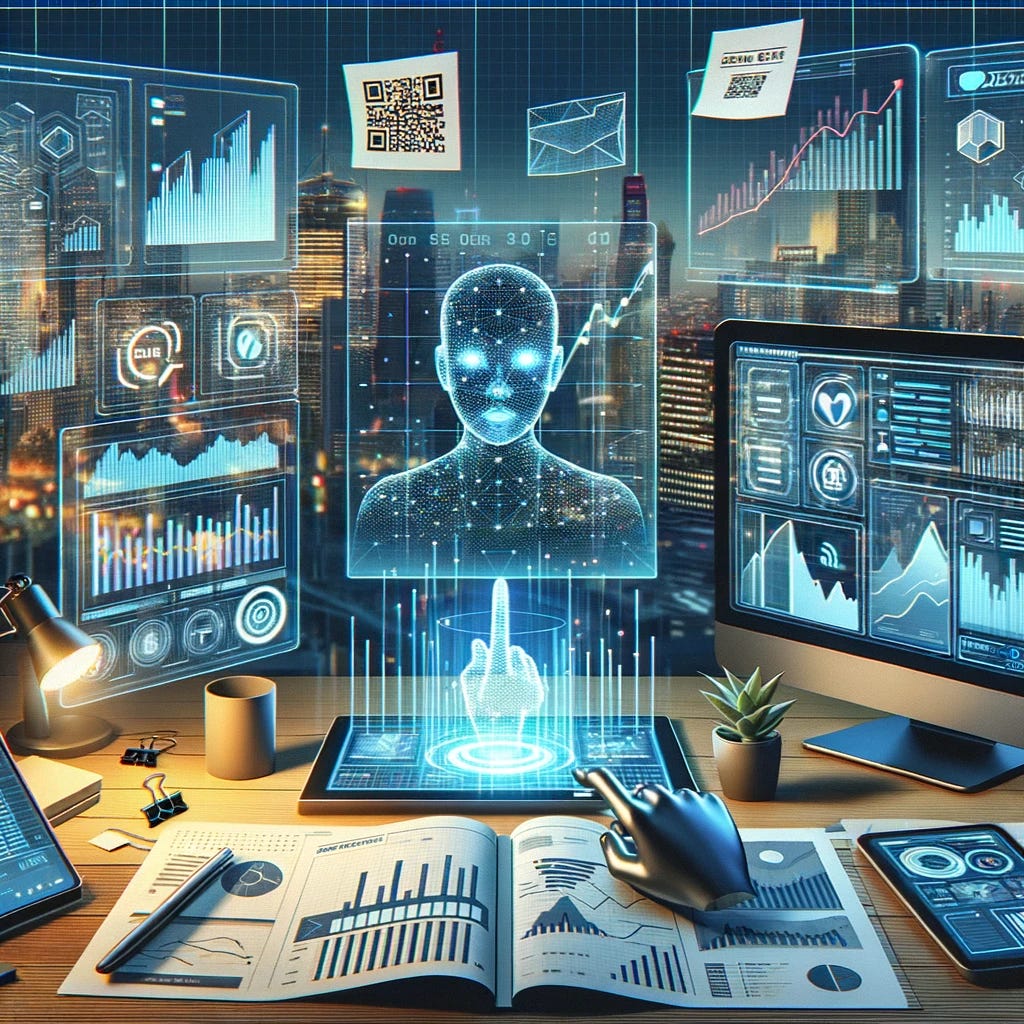Future of Finance: AI & GenAI's Transformation of Financial Work
The Rise of AI & GenAI and Its Implications for Job Roles
A personal piece of my own opinion about the Future of Finance in 2023 and 2024.
Artificial Intelligence (AI) will bring incredible changes to the financial sector.
Generative AI (GenAI) will improve customer services and reduce labor work.
Democratization of data and analytics will enable the fast processing of vast datasets to solve recent challenges and create new opportunities.
Besides that, recently, I read an interesting statement from Emily Prince, Group Head of Analytics at LSEG:
“Everyone is a student when it comes to AI. We’re collectively shaping how we manage the risks while making the most of the transformative opportunities ahead”.
For me, this underlines the truth so much that I had to bring it into my professional life and present it to my clients and bosses. For those who don't know me, I lead the Data Science, AI, and Research team at a bank in Luxembourg.
This means that I shouldn't be a student anymore regarding AI. But that would be a lie... I keep telling my staff they have never finished learning, especially in AI, where researchers are developing innovations and new models every day.
Since 2019 with GPT-2, 2020 (GPT-3), 2022 (GPT-3.5), ChatGPT at the end of 2022, and in 2023 GPT-4, we have seen tremendous possibilities of how AI can be applied not only for researchers but also for everyone out there. ChatGPT has been one of the smartest breakthroughs I have observed recently, not because of the immense technological investment behind it but because of the simple but intelligent application of AI behind a chatbot. One way everyone can interact with and gain insight into how AI can enrich a personal life.
I. Brief Overview of the Ongoing AI Evolution in the Finance Sector
Artificial Intelligence is a highly valued tool for business due to its ability to process vast amounts of data in a short amount of time - increasing efficiency and productivity.
Through both capabilities, adopting AI in Finance was a logical consequence.
In Finance, we already could observe adoptions in:
Front office: Financial institutions leverage AI to improve customer experience by offering new services, faster decision-making, and virtual assistants.
Middle office: Eliminating false positives improves fraud processing. Vast data injection optimizes financial risk assessments and projections.
Back office: Document processing, automated invoicing, and optimized accounting also make AI a valuable asset in the back office by supporting the process of processing applications faster.
In an article published by Gartner on August 17, 2023, they presented the new hypes of AI in 2023 - mostly GenAI.
Gartner Director Analyse Afraz Jaffri stated:
“The AI Hype Cycle has many innovations that deserve particular attention within the two-to-five-year period to mainstream adoption that include generative AI and decision intelligence.”
First prediction:
It is expected that JPMorgan and other major players in the Financial world will soon start using GenAI in their back-office and middle-office processes to improve their efficiency and productivity.
The reason for this is that back and middle offices are operated by humans, who will ensure that the outputs of Generative AI services are controlled before they are incorporated into the decision-making process. This is particularly crucial during the early stages of GenAI adoption, as models such as ChatGPT, LLama2, and Bard tend to produce inaccurate results when unsure of the answer (Hallucination).
This risk must be mitigated, and the only way to do so at present is through the intervention of humans. Therefore, the applications of GenAI are mainly limited to back and middle offices until researchers develop more advanced GenAI systems.
However, some few financial institutions will try and pioneer the adoption of GenAI in front offices in use cases such as:
Product explanation on their website
Virtual assistants
Customer services
This will not pose any risk to either the customer or the bank.
II. AI and Financial Jobs
While at universities, students learn about machine learning projects, including Linear Regression, Random Forest, and the seven-step process. The finance world is undergoing a digital transformation, which the advent of GenAI has accelerated.
1. Role Transformation
The days are gone when manual data analysis and predictions were the norm. The days are gone when Excel was the powerful analytics tool for the business analyst/domain expert. AI merits its place by automating routines, tasks, and processes, relieving employees of everyday routines.
It is like a key, unlocking a hidden potential, making room for time to use to create better strategies and higher-value activities. Probably one of the most promising changes will be the following:
Domain experts will evolve into Citizen Data Scientists:
A Citizen Data Scientist (CDS) is not a replacement but instead a collaborator for the data science team. They are business experts willing to analyze data and discover new trends. According to Gartner, CDS are 'power users' capable of executing simple and moderately sophisticated analytical tasks, usually without coding. In the financial sector, the concept of CDS is far from theoretical. Many professionals using Excel or Tableau to analyze data can be transformed into Citizen Data Scientists with some training and the correct set of tools. More information can be found in my article:
The Rise of Citizen Data Scientists in Finance: A Catalyst for Transformation
Data supreme in the finance industry, from trading algorithms to risk assessments. While data scientists have traditionally used these massive data lakes, a rising cadre of professionals are stepping up to share the load: Citizen Data Scientists. But what exactly are Citizen Data Scientists…
Besides domain experts evolving into Citizen Data Scientists, we will likely see the following evolutions:
Second prediction:
With changing customer expectations, chasing from one financial service provider to the next for better services and cheaper interest rates, banks need to evolve. How customers interact with their banks now and in the future will fundamentally change.
We will observe a shift from traditional data processing strategies to analyzing structured (transactional data) to unstructured data (emails, text, voice messages, etc.). The use of Big Data requires fundamental infrastructure changes. Fortunately, fast computers, hardware, software, or cloud services are no longer exotic. These two components (data and infrastructure) will allow banks to develop a new source of income besides interest and investments.
Banks can democratize access to their data, streamline decision-making, and provide better insights to their retail or commercial customers to decide whether markets are favorable or deteriorating - banks are sitting on an immense amount of data that makes them one of the wealthiest data sources available in 2023.
Decentralizing the Power of Data: A Financial Paradigm Shift in 2023
In the digital age, data has often been likened to oil, a valuable resource that powers much of our modern world. However, unlike oil, data is ever-expanding, with the World Economic Forum estimating that data creation would surge to a staggering 94 Zettabytes in 2022, a significant leap from 74 Zettabytes in 2021. But raw data, much…
2. Job Opportunities and New Job Categories
With every new technological innovation, we have witnessed a corresponding increase in job opportunities, and the advent of AI and GenAI is no exception.
These aren't just new names on the office door but new opportunities for people to learn, grow, and bring fresh ideas to the table. They are the bridge to a future where finance and technology go hand in hand, opening up new ways of doing things that we might not have thought of before.
Third prediction:
(New) AI Ethics Officers: They ensure the AI tools are fair and don't harm anyone.
Data Scientists: They sift through heaps of data to find valuable insights to help make better decisions.
(New) AI-driven Financial Advisors: They use AI's findings to give personalized advice to clients on managing their money.
Machine Learning Engineers: They design and build systems that allow computers to learn from data and improve over time.
(New) AI Compliance Analysts: They ensure that the use of AI follows all the rules and regulations.
(New) AI Solution Architects: They plan and create AI solutions to solve specific problems faced by financial institutions.
AI Research Scientists: They explore and discover new ways AI can be used or improved.
(New) Prompt Engineer / Data Scientist: They are specialized in interacting with GenerativeAI solutions such as LLama2, GPT-4, Midjoruney, etc…
These new roles are like opening doors to a world where finance isn't just about numbers but about how we can use technology to understand and work with those numbers in new and better ways. They invite folks to learn new skills, think out of the box, and be part of the exciting changes AI is bringing to the financial world.
III. Conclusion
Integrating Artificial Intelligence (AI) and Generative AI (GenAI) into the financial sector is reshaping how businesses operate, offering enhanced customer experiences, and streamlining data processing.
The continuous evolution of AI demands ongoing learning and adaptation.
While AI offers vast opportunities for innovation, it's essential to manage its associated risks. The transformation is not just technological; it's also reshaping job roles and introducing new career paths that blend finance with technology.
With the rich data at their disposal, financial institutions are at the point of a new era, providing outstanding services and insights to their clientele.
Tl;DR
AI and GenAI are transforming the financial industry.
Continuous learning is vital, given AI's rapid evolution.
AI's integration spans front, middle, and back office functions.
GenAI's primary focus is on middle and back offices due to accuracy concerns.
Financial job roles are evolving; new AI-focused roles are emerging.
Financial institutions hold vast data, offering the potential for innovative services.









